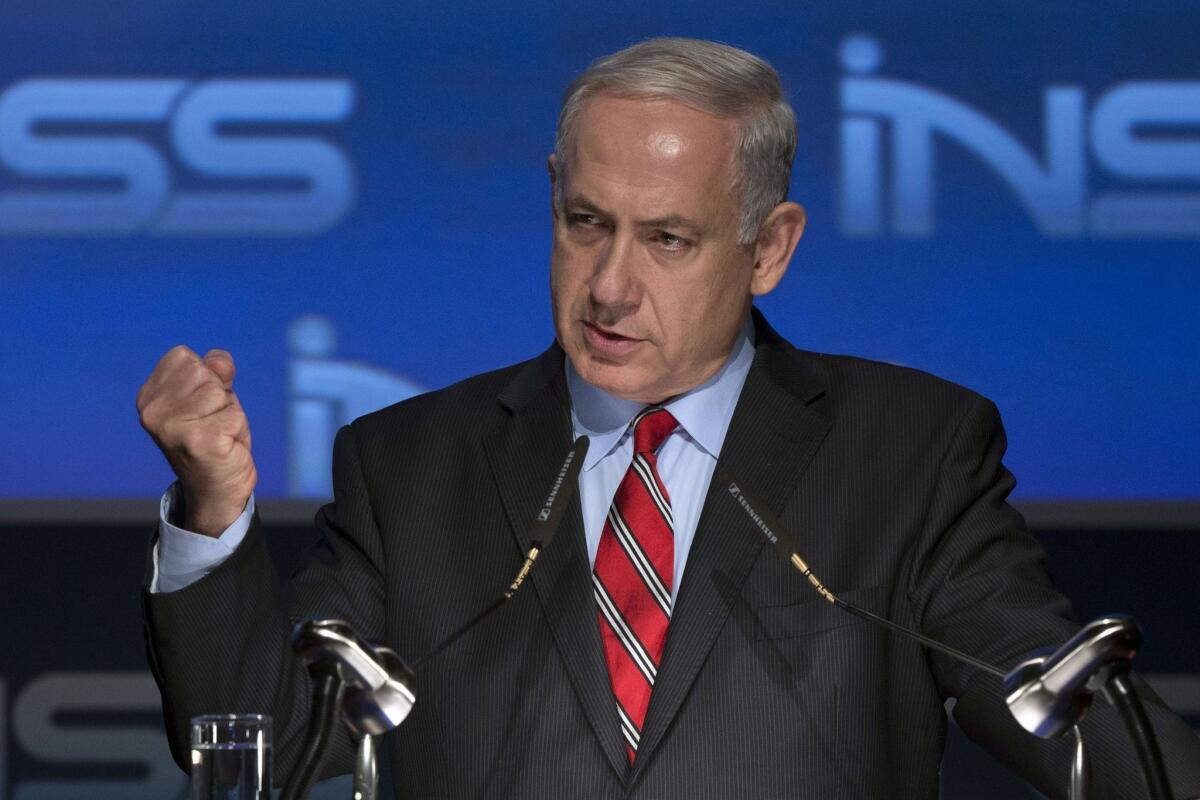Many visions, little accord on Israeli-Palestinian peace talks

TEL AVIV -- Palestinian Authority President Mahmoud Abbas and Israeli Prime Minister Benjamin Netanyahu laid out clashing visions of a two-state solution here Tuesday during an Israeli security conference.
In a taped interview broadcast at the conference, Abbas insisted that Israeli troops pull out of Palestinian territories in the West Bank within three years after a peace agreement is reached. He suggested a third party, such as the North Atlantic Treaty Organization, oversee an Israeli withdrawal and maintain a long-term security presence in the area.
Speaking at the conference Tuesday night, Netanyahu rejected the idea of a complete Israeli withdrawal, insisting, as he has in the past, that some Israeli soldiers stay in the West Bank along the Jordanian border. That task is one of several security matters that must remain “in the hands of Israel,” he said.
The role of Israeli troops in a future Palestinian state is just one of many looming questions as an April deadline for concluding peace negotiations set by U.S. Secretary of State John F. Kerry approaches. Each side has accused the other of sabotaging the talks.
At Tuesday’s conference, which was organized by an Israeli think tank and held in an auditorium at the Tel Aviv Museum of Art, the challenges were laid bare.
In his video address, Abbas said he would not agree to an accord unless East Jerusalem was named the capital of a Palestinian state. Several hours later, Israeli Economy Minister Naftali Bennett told the same crowd that East Jerusalem is “the land of Israel.”
“Our ancestors would never forgive an Israeli leader who gives away our land and divides our capital,” said Bennett, who was elected to the Knesset, or parliament, last year on a platform that included opposition to a Palestinian state and who is a part of Netanyahu’s ruling coalition. “It was ours 4,000 years ago and it will be ours for another 4,000 years until eternity.”
Another Israeli critic of the negotiations told the crowd that Israel should step back from the bargaining table.
Israeli Defense Minister Moshe Yaalon said an agreement “should not be rushed” and said Israel should focus first on developing the Palestinian economy. Early this month, Yaalon found himself in hot water after he criticized Kerry’s peace mission as “messianic.”
Disapproval of the negotiations has not been confined to the Israeli side. This month Nabil Shaath, a senior member of Abbas’ Fatah party, which controls the West Bank, said he was disappointed that negotiations have focused on security rather than drawing borders.
Hamas, the Islamic faction that rules the Gaza Strip, has in the past opposed the negotiations. But in his address Tuesday, Abbas said the group had signed an agreement with him supporting the talks. This week Saeb Erekat, the chief Palestinian negotiator, is scheduled to meet with Kerry in Washington to discuss the framework for continued negotiations.
Even the think tank that hosted the conference, the Institute for National Security Studies, expressed skepticism Tuesday that a resolution to the decades-long peace process is in the works.
The INSS, which is headed by former Israeli military intelligence chief Amos Yadlin, offered its own plan in the event the talks fail.
If an agreement cannot be reached by diplomatic means, the group says, Israel should unilaterally withdraw from 85% of the West Bank while maintaining military control over the Jordan Valley, the largest of the Israeli settlement blocks and a strip of land near Ben Gurion Airport.
<runtime:include slug=”la-fg-wn-alsos” />
Twitter: @katelinthicum
More to Read
Start your day right
Sign up for Essential California for news, features and recommendations from the L.A. Times and beyond in your inbox six days a week.
You may occasionally receive promotional content from the Los Angeles Times.







